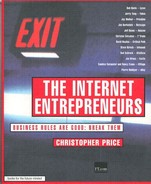The formation of Yahoo!
Jerry Yang, now 31, was ten when his family moved from Taiwan. His father had died, and his mother emigrated to the USA with her two children. He believes the importance of this move in terms of his development cannot be underestimated:
'It was probably the most significant event of my life, with being married being a close second. But especially from a perspective of being an entrepeneur, being able to experience the business culture in the US was a unique one.
'The US is special in that an immigrant can do what I did and be part of it. And not only me - but Jeff Mallett (Yahoo chief operating officer) is a Canadian. In fact, I would say that most key people at Yahoo have a relationship of being a first or second generation immigrant.
'It's clear that I am only an example of what could happen to people if they find the right place and the right opportunities and go for it.'
Yang believes the diversity and ethnic mix at Yahoo has played an important part in the company's development:
'I do think a lot of people who are new to the US tend to have a diversity of cultural background. In my case I was raised in a Chinese family and have a lot of values that are fairly Chinese and Eastern. Whereas my education, training and my business instincts are mostly Western. So I think that that type of diversity can be a good thing, and reflects on Yahoo as a global company that just happens to be congregated in Silicon Valley.
'I don't think necessarily it's an advantage or disadvantage because there are plenty of people who are born in the US that are very successful. But I think in our case the diversity really is a big part of our strength as a company.'
Yang had met David Filo at Stanford University, California, in 1990. He takes up the story:
'David was in the graduate school when I was still an undergraduate, being a teaching assistant at a couple of my classes. So I met him then but I didn't really get to know him until I joined the graduate school doing research in the same lab.
'We started hanging out together and spent six months in Japan. Being students and putting yourself in a poor environment really bonds you. In fact, a lot of people we met at this time ended up being in Yahoo too.
'Being in the same research team, which was relatively small, you get to know everybody very, very well; they were a second family and David was, and will continue to be, one of my best friends.'
Yang describes the discovery of Yahoo as an 'accident', while he and Filo were supposed to be working on a postgraduate thesis:
'It wasn't so much of a grand plan. In fact, it was quite accidental. We started with some listing of websites that he liked and some I liked, and I wrote some software.
'I said why don't we put it into a database and we can both add and change and delete from it. And that list grew from a few hundred to a few thousand. We thought: this is a website to get to other websites - maybe we should put it on the web?
'This was 1994 and before we knew it we had people from 90 countries logging in and then telling other people to try this thing out. It wasn't called Yahoo at the time - it was Terry's Guide To The World Wide Web. I'm glad we didn't keep that name.
'It was really a gradual thing. People thought it must have been some grand plan but it wasn't. It was built by people saying this is great, I love your search engine, but you have got the law section all wrong, here's how you do the law section. Or I'm a physicist in Geneva and here's how you fix your astral physics section. So we got help from all over the world and you get pushed by that kind of demand.'
Although Yahoo may have been an accident in Yang's eyes, he and Filo both had designs to do a start-up even while they were at college:
'David and I both got the entrepreneur bug. One of the reasons we were in the research group was that we thought by joining an outfit that had spawned a lot of entrepreneurial companies, we would benefit.
'We were involved in the design automation because at the time we joined there were a lot of start-ups in that area. We figured if we got a PhD in this subject we could go and start up something like that.'
we never thought Yahoo could be this big
However, as their interest in the internet grew, the two students were spending more and more time examining the business potential of the new medium. But not Yahoo. 'That was the funny thing. In the summer and fall of 1994, while we were maintaining Yahoo and growing it as a hobby we were writing business plans about other internet businesses because we never thought Yahoo could be this big.'
